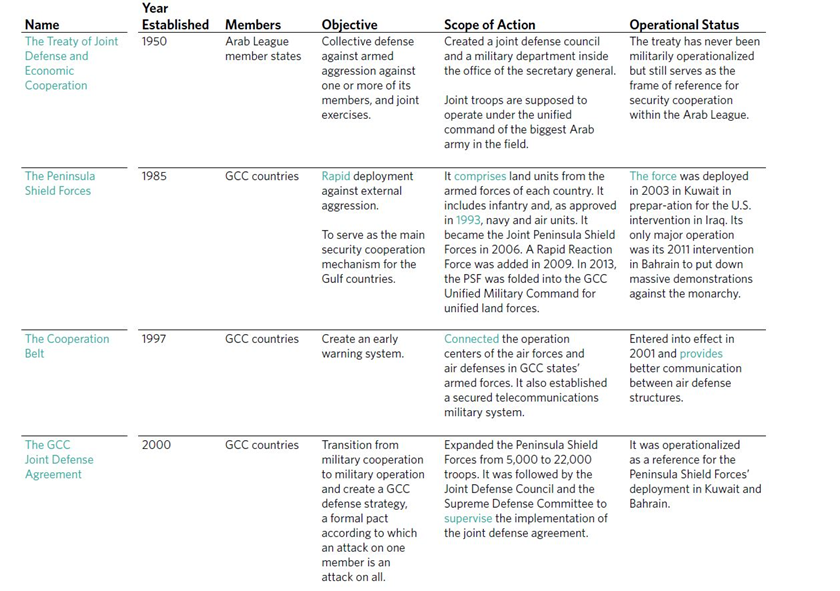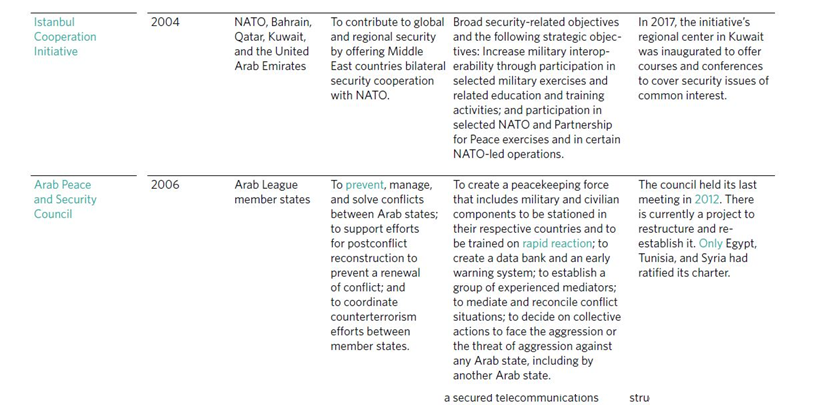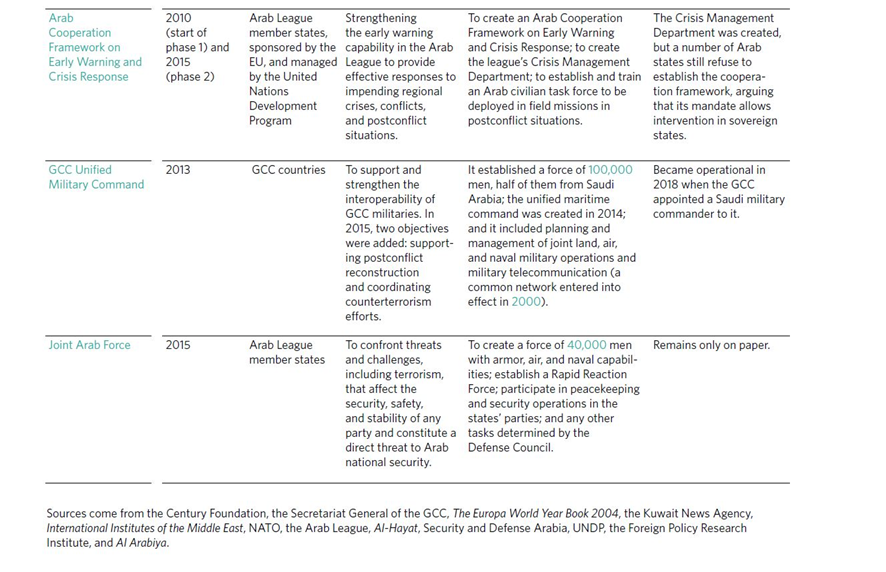The Unfulfilled Promise Of The Proposed Middle East Strategic Alliance

Written by Abbas Ismail on 28 March 2024
The Middle East Strategic Alliance (MESA) proposed during the Trump administration was intended to be a formidable NATO-style coalition that would strengthen security cooperation between the Arab Gulf states, Jordan, Egypt and possibly Morocco. (See the table below for the current security and defence structures of the Arab MESA members) Its main objectives were to combat Iranian influence and regional terrorism. Historical initiatives such as the Baghdad Pact[1] and more recent proposals such as the Gulf Shield organisation have also failed due to the conflicting interests of regional leaders and the wavering commitment of the US (Chtatou, 2022). However, recent geopolitical changes, particularly growing concerns about Iranian aggression and the increasing influence of Russia and China in the Middle East, have reignited the discussion about forming a coherent alliance (ibid). Despite the ambitious nature of this initiative, MESA did not materialise. This brief analysis examines the reasons for MESA’s failure, focussing on diverging regional interests, lack of consensus, operational challenges, changes in US policy and public opinion.
Diverging interests and priorities
The Middle East is characterised by a complex network of political and economic rivalries that make it difficult to form unified alliances. The countries of the Gulf Cooperation Council (GCC), for example, have constant disputes that make co-operation difficult. The blockade of Qatar by Saudi Arabia, the United Arab Emirates, Bahrain and Egypt in 2017 highlighted these tensions. This internal disagreement made it difficult to form a united front within MESA. In addition, the threat is perceived very differently in the region. While Saudi Arabia and the United Arab Emirates see Iran as the main threat, other states such as Qatar and Oman maintain more balanced relations with Tehran. These different threat perceptions have made efforts to develop a cohesive strategy against Iran more difficult.
Lack of consensus
The failure of MESA was also due to the different levels of enthusiasm between the proposed members. Not all countries were equally in favour of the alliance. Egypt, for example, expressed reservations about participating in military operations or escalating tensions with Iran, favouring not to get involved in conflicts it saw as Gulf-centred. In addition, some states did not want to be perceived as too closely aligned with US policy and instead preferred to maintain strategic autonomy and balanced foreign relations. This lack of consensus on key issues hindered the alliance from achieving the necessary traction.
Operational and Logistical Challenges
The integration of the military capabilities of different countries represents a major operational challenge. The MESA member states have different defence systems, doctrines and levels of technological development. Coordinating these different elements into a coherent defence structure proved to be a daunting task. In addition, creating a clear and effective command and control structure for MESA was complex given the sovereignty concerns of the member states. Each state did not want to cede too much control over its military operations to a central authority, which further complicated the formation of the alliance.
United States Policy Shifts
The changing priorities of US foreign policy also played a decisive role in the fact that MESA did not materialise. The shift from the Trump to the Biden administration marked a change in the US approach to the Middle East. While the Trump administration was intent on forging new military alliances to counter Iranian threats, the Biden administration prioritised diplomatic engagement and reentry into agreements such as the Iran nuclear deal. This policy shift led to a lack of lasting momentum for MESA, as the new administration’s priorities diverged from the fundamental goals of the alliance.
Public Opinion and Legitimacy
Public opinion in some of the member states also represented a major hurdle. Many populations were sceptical about deeper military ties, especially those that were perceived to serve US interests rather than regional stability. This scepticism undermined the political will needed to push MESA forward. The legitimacy of such an alliance was often questioned and critics argued that it prioritised geopolitical strategies rather than the true security needs of the region.
Conclusion
To summarise, the failure of the Middle East Strategic Alliance illustrates the complexity of building a collective security framework in the Middle East. Regional rivalries, differing threat perceptions, logistical challenges, changes in US policy and public opinion have all hindered the formation of such alliance. These factors make it clear how difficult it is to achieve coherent regional security cooperation in a landscape characterised by political fragmentation and divergent national interests. Although the MESA initiative was ambitious, it ultimately foundered on these complex and deep-rooted challenges.
[1] The Baghdad Pact, later renamed CENTO (Central Treaty Organization), was a defence alliance founded in 1955 by Turkey, Iraq, Britain, Pakistan and Iran with the main aim of preventing communist incursions and promoting peace in the Middle East. Due to regional tensions and the withdrawal of key members such as Iraq and Iran, the pact eventually dissolved and evolved into an organisation mainly for economic and technical cooperation before it was dismantled in 1979. More on the Baghdad Pact see https://2001-2009.state.gov/r/pa/ho/time/lw/98683.htm
Current Security and Defence Structures Within Arab MESA Members (retrieved from Farouk, 2019)



Refrences
Chtatou, M. (2022, September 14). The Middle East NATO: From fiction to fact. The Washington Institute. https://www.washingtoninstitute.org/policy-analysis/middle-east-nato-fiction-fact
Congressional Research Service (2021, January 14) “Iran’s Foreign and Defense Policies”
Further Readings
Farouk , Y. (2019). The Middle East Strategic Alliance Has a Long Way to Go. Carnegie Middle East Center. https://doi.org/https://carnegieendowment.org/files/2-8_Farouk_MESA.pdf
Jacobs, A., & Foucher, L. (2022, October 3). The myth of an emerging “Mideast nato.” Crisis Group. https://www.crisisgroup.org/middle-east-north-africa/gulf-and-arabian-peninsula/united-arab-emirates-israelpalestine-saudi
Williams , D., & El – Yaakoubi, A. (2022, June 20). Israel says it’s building regional air defence alliance under U.S. Reuters – Middle East. https://www.reuters.com/world/middle-east/israel-says-building-regional-air-defence-alliance-under-us-2022-06-20/